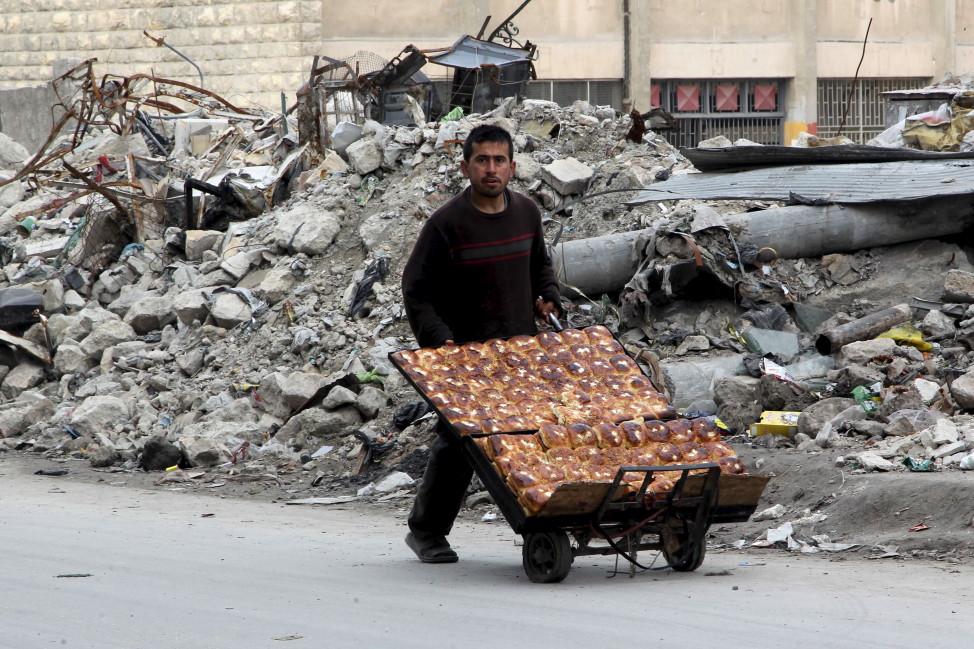Cautious optimism may be the best way to term the agreement reached Thursday in Munich for a cessation of hostilities in Syria.
U.S. Secretary of State John Kerry, who came to Munich to make an “all or nothing” effort, was soberly realistic, saying implementing a nationwide cessation of hostilities within a week “is ambitious.”
The agreement, which would allow the immediate delivery of much needed food, water and medical supplies to Syrian civilians, is not being called a cease-fire, which Kerry described as a more permanent step. Still, it is somewhat encouraging that the U.S., Russia and others at the table can agree to take this first step.

Syrians fleeing the conflicts in Azaz region, wait at the Bab al-Salam border gate in Syria on Feb. 5, 2016. (AP)
A Chance to Halt the Brutality in Syria
The Editorial Board – The New York Times
As Secretary of State John Kerry noted, “The real test is whether all parties honor those commitments.” Given the brutality and dictatorial ambitions of Syria’s president, Bashar al-Assad, and the duplicitous behavior of his chief ally, President Vladimir Putin of Russia, that is a huge if. But for the moment it is worth celebrating a step toward what could be the first sustained halt in the fighting in Syria since the civil war began in 2011.
Until now, Mr. Putin has been fully engaged in the destruction of Syria and its people. In the last five months, Russian aircraft and bombs have reportedly killed nearly 1,400 civilians, including 527 women and children, all in the service of perpetuating Mr. Assad’s brutal and unyielding dictatorship.
In Syria, Russia Is the Real Threat
Wesley K. Clark – USA Today
Now there is Russia — with its scary S-400 air defense system, new jets and an implicit nuclear threat. As attention turns to some form of coordinated action against ISIL and other terrorists groups left out of the cease-fire, the United States and our allies cannot leave Russia’s position uncontested and a weak role for our allied-funded “good” jihadis….
Leverage against Russia could come from intensified sanctions by Europe — a new set imposed for Russia’s contribution to the humanitarian catastrophe that is emerging in northern Syria. It could also come from increased NATO resolve in strengthening the frontiers of Western values in the Baltics, and in Ukraine. Further, with their hand on the oil tap, our Saudi friends could “punish” Russia with continued low oil prices, or by agreeing to curtail production and raising oil prices to persuade the Russians to go home in return for economic revitalization.

A man selling pastries walks past the rubble of damaged buildings in the rebel held al-Shaar neighborhood of Aleppo, Syria on Feb. 10, 2016. (Reuters)
Enough Is Enough – U.S. Abdication on Syria Must Come to an End
Michael Ignatieff and Leon Wieseltier – The Washington Post
The conventional wisdom is that nothing can be done in Syria, but the conventional wisdom is wrong….Operating under a NATO umbrella, the United States could use its naval and air assets in the region to establish a no-fly zone from Aleppo to the Turkish border and make clear that it would prevent the continued bombardment of civilians and refugees by any party, including the Russians….
What Vladimir Putin is Really Up to in Syria
Dennis Ross – Los Angeles Times
If Russian President Vladimir Putin’s priority had been the diplomatic process, he would have acted to promote the cease-fire, not increased the tempo of Russian military operations.
A woman walks through rubble after airstrikes by pro-Syrian government forces in the rebel held town of Dael in Deraa, Syria on Feb.12, 2016. (Reuters)
He would have conveyed to us that he would stop Syrian President Bashar Assad from using barrel bombs and force him to open humanitarian corridors for food and medicine.
The nature of the Russian strikes makes clear that Putin was not just trying to improve Assad’s leverage before negotiations. No, he was intent on changing the balance of power fundamentally on the ground and sending a message to Arab leaders.
If Assad Wins, Islamic State Wins
Noah Feldman – Bloomberg View
The civilians fleeing Aleppo don’t prove definitively that, with Russian backing, President Bashar al-Assad will win the Syrian civil war. But it’s certainly time to game out that scenario and ask: What would victory look like to Assad? And what will happen to the other regional actors engaged in this fight?
The decisive element to consider is whether Assad needs to defeat Islamic State to be a winner. If the answer is yes — and if Assad could do it — the world would probably breathe a sigh of relief, and accept Assad’s victory, despite its extraordinary human costs and egregious violations of human rights.
John Kerry’s Desperate Push on Syria
David Ignatius – The Washington Post
Secretary of State John F. Kerry said in an interview that the United States is nearing a final “crunch time” on Syria — in which it will either make progress toward a cease-fire or begin moving toward “Plan B” and new military actions.
Kerry’s problem, skeptics would argue, is that his strategy has the same logical flaws that have scuttled three years of Syria diplomacy: Russia and Iran won’t compromise on their fundamental support for President Bashar al-Assad’s regime; and President Obama won’t approve military tactics that could actually shift the balance. So each diplomatic inflection point comes and goes — with greater misery for the Syrian people.

U.S. Secretary of State John Kerry and Russian Foreign Minister Sergei Lavrov (L) attend the International Syria Support Group (ISSG) meeting in Munich, Germany, February 11, 2016, together with members of the Syrian opposition and other officials. REUTERS


